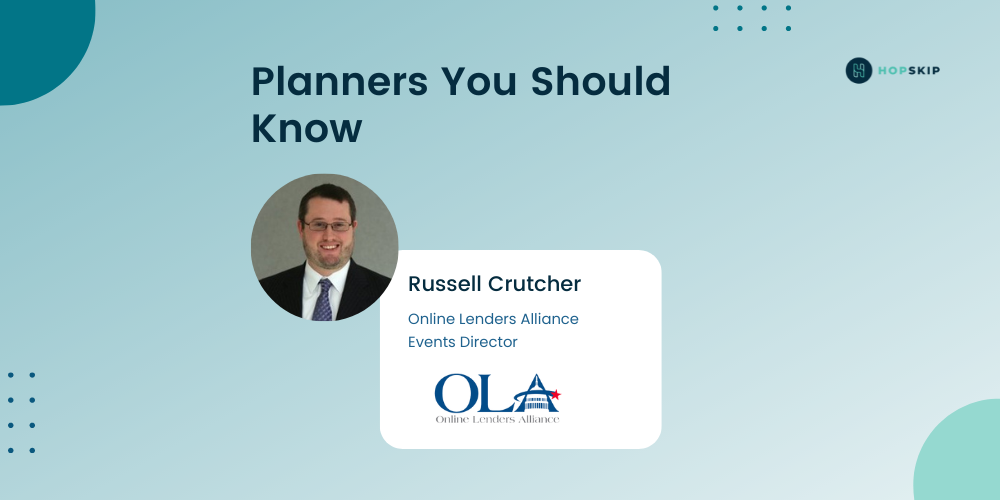This post is part of the HopSkip Planner Spotlight Series where HopSkip spotlight's planners across the industry to bring awareness of how they adapted to COVID-19, communicating and lessons learned and sharing how they are viewing the meetings and events industry in a post-pandemic world.
Name: Russell Crutcher
Company Name: Online Lenders Alliance
Job Title: Events Director
Years of Experience: 13
How did you get your start in the events industry? What made you pursue this role?
I started out as a temp at a trade association in DC as a staff assistant. When an opening became available in their events department, I jumped on it because it offered international travel and, frankly, I needed a full time job fast. I never thought I'd spend my life in event management but I immediately feel in love with the work and never looked back.
How do you compare planning your first in-person event post-pandemic, to planning meetings/events pre- Covid? What was different and unique? What was similar?
Our first in-person event after COVID was very different from those that came before in terms of logistical planning. I had to create a set of COVID-19 protocols, reimagine our networking, and basically plan two events since we decided to go hybrid. However, our program content and session formats largely remained the same.
What was your number one challenge in hosting your first in-person event(s) and how did you overcome it?
The number one challenge was trying to put on a quality experience for those joining virtually and honestly, I don't think we did overcome it. We put on very successful fully virtual conferences during the pandemic and we've put on very successful fully in person events since, but trying to do both at the same time just doesn't work for our conference and our audience.
What is the top learning that you uncovered from the last two years that you’re implementing in your planning process today? (any other tips or tricks you want to share?)
In the last two years, I've gained a whole new appreciation for the importance of in-person networking at our conferences. I always knew that people enjoyed the receptions, etc., but I failed to appreciate just how much of a driver those interactions were to the overall success of our events. Now I make sure to leave ample "free time" on our agendas to insure that people have the schedule flexibility that they need to make meaningful connections while at our conferences.
With hotels short-staffed, and RFP lead time shortening, what is your advice to other planners to overcome these obstacles when requesting hotels for proposals?
Regarding hotel staffing, be sure to start the conversation early with your hotel lead. Let them know that you understand they might be short-handed in certain areas and that as long as they are honest with you and identify those potential shortfalls up front, you can work together and come up with a plan to make sure that your participants never notice. Regarding RFPs and sourcing venues, my only advise is to start earlier. My timeline for booking future conferences has basically moved out an additional 18-24 months compared to before the pandemic.
Are you approaching contracting with hotels differently, post-pandemic?
Yes. Most importantly, you have to start the process earlier. I'm also noticing that the concessions you may have received in the past may no longer be available. I'm looking at a contract now with a room rental fee, something I never saw pre-pandemic.
What is the biggest area of improvement that you think hotels can make when either responding to your RFPs or during the contract phase of your event?
Be communicative. Don't just respond to the RFP without having a follow up phone call to flush out the details that won't be captured on paper. Also, be patient, hotels took a beating during the pandemic but our organization didn't get our event revenue, either, and many of us are working with reduced staffs and tighter budgets, just like you.
Due to the pandemic, our events community had to evolve, adapt, and grow. Many planners started to embrace new technologies as a result of the pandemic. What new tech are you using today in your planning process as a result?
For some of our smaller events, such as our board meetings, we discovered that a virtual meeting worked just as well as in-person, while removing the burden of excessive travel. The advancement in virtual platforms over the past few years has made them much more versatile and cost effective than pre-pandemic.
Since education and relationships are two major pillars in the meetings and events industry, any suggestions on how other planners can learn and network with their peers across the industry?
I would love to see more national conferences geared towards event planners. Conferences like ASAE's XDP were terrific but don't appear to have survived the pandemic. So many of the other conferences just feel like a round-robin of meetings with CVBs that lack quality session content to help us plan better events.
This post is part of the HopSkip Planner Spotlight Series where HopSkip spotlight's planners across the industry to bring awareness of how they adapted to COVID-19, communicating and lessons learned and sharing how they are viewing the meetings and events industry in a post-pandemic world.
